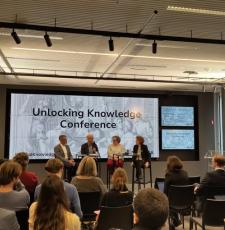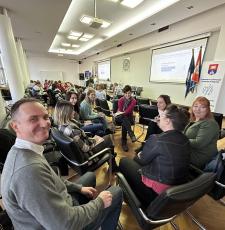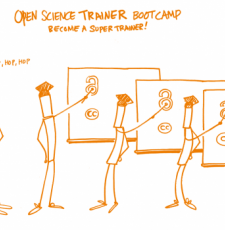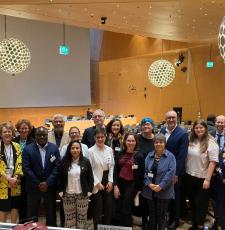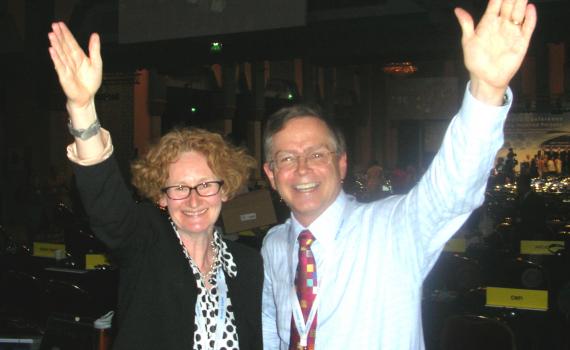
EIFL joins the World Blind Union and our global partners in celebrating the entry into force of the Marrakesh Treaty for persons with print disabilities. In this blog, EIFL Copyright and Libraries Programme Manager Teresa Hackett discusses what the ‘miracle of Marrakesh’ means for print disabled people. Teresa is on the World Blind Union (WBU) Marrakesh Strategic Advisory Group.
On 30th September 2016, the Marrakesh Treaty for persons with print disabilities enters into force.
The treaty is a game-changer for people who are blind or partially sighted, as well as for libraries that serve people with print disabilities.
From now on, in all countries that are party to the treaty, accessible format copies such as Braille, audio, digital and large print can be made on-demand and shared across borders, enabling institutions such as libraries to serve all their users equally - same book, same day.
This is because the treaty mandates the making of accessible format copies and sharing across borders, without having to seek permission from rightsholders. In a nutshell, print disabled people can no longer be denied access to books and other reading materials in alternative formats due to copyright restrictions.
The treaty applies to countries that are party to it - at the time of writing, 22 states. With every new country that joins, we are a step closer to ending the book famine - the fact that only 7% of published works are made available globally in accessible formats. In the developing world, where 90% of blind and visually impaired people live, the figure is less than 1%.
EIFL urges every single country to ratify the Marrakesh Treaty so that people everywhere who are blind, partially sighted or have other print disabilities can benefit.
A treaty of firsts
The Marrakesh Treaty is a treaty of many firsts.
- It is the first copyright treaty to address the needs of a group of users, rather than creating new rights or strengthening copyright protections for content owners.
- It is the first copyright treaty ever with human rights principles at its core, with specific references to the Universal Declaration of Human Rights and the United Nations Convention on the Rights of Persons with Disabilities.
- It upholds for the first time the right to read for the world’s print disabled people, for all types of printed works and all formats.
- It gives libraries a key role in the successful implementation of an important international treaty, and a new global responsibility in providing accessible format copies to persons with print disabilities.
How? Because libraries throughout the world are home to the largest collections of accessible materials. And under the treaty only blind people’s organizations, libraries and other so-called ‘authorized entities’ can send accessible format copies to other countries.
Signed, sealed, delivered
Fifty-one countries signed the treaty in Marrakesh on 26 June 2013 – the largest number of countries ever to sign a WIPO-administered treaty immediately upon adoption. By signing a treaty, a state expresses the intention to comply with its provisions (indicating a political intention to support the treaty).
Since its adoption, the Marrakesh Treaty has succeeded in getting more ratifications (formal national approval that is legally binding on the state) than any other WIPO treaty during this time.
When music legend Stevie Wonder made good on a promise to travel to Marrakesh and to play for government negotiators if the treaty was adopted, it also became the first WIPO conference to feature dancing in the aisles!
The lyrics to Stevie’s Grammy-nominated hit ‘Signed, sealed, delivered’ had never seemed so apt as on that historic night in Marrakesh.
Five years supporting the right to read
EIFL was involved at each stage along the road to Marrakesh, supporting negotiations over five years at the World Intellectual Property Organization (WIPO), participating in the Diplomatic Conference in 2013 that sealed the Marrakesh Treaty, and attending the inaugural meeting on 5th October 2016 of the Marrakesh Assembly, the body that administers the treaty, chaired by the Minister of Culture of Brazil.
Adoption of an international treaty was the first building block to expanding access to accessible content globally. But the process didn’t stop there. The focus shifted to the national level - to make the treaty a reality in every country around the world through ratification and, where required, implementation into national law.
After the treaty was adopted, we accelerated our work with libraries in partner countries from Mongolia to Moldova to support speedy ratification in fulfillment of the treaty’s objective - to help end the book famine. Through a range of measures, including production of specialist resources and providing professional advice, we prioritized work to advance take-up of the treaty.
We were delighted in 2015 when the track record of EIFL as an effective advocate for Marrakesh was recognized in 'Our Right to Knowledge', a report by the United Nations Development Programme (UNDP) and the World Blind Union – Asia Pacific (WBUAP).
Here is a snapshot of our achievements and current activities in seven countries: Mongolia, Senegal, Nepal, Kyrgyzstan, Lesotho, Lithuania and Moldova.
Mongolia - the 10th country to ratify the treaty
We were delighted when Mongolia became the 10th country to ratify the treaty in September 2015, marking the halfway point towards entry into force. In a project supported by EIFL, the Mongolian Libraries Consortium (MLC) led the ratification campaign, in partnership with the Mongolian National Federation of the Blind (MNFB). Now we are supporting progress on changing the national copyright law to implement the treaty.
Senegal - libraries leading the campaign to ratify
In Senegal, the Consortium des Bibliothèques de l’Enseignement Supérieur du Sénégal (COBESS) is leading a campaign for ratification in partnership with Amitiés des Aveugles du Sénégal (AAS), and Sightsavers West African Regional Office. Good progress has been made thanks to the commitment of great local advocates.
Nepal - translation of the treaty into Nepali and Braille
In September 2015, EIFL co-organized the first seminar in Nepal dedicated to library copyright issues when participants from the disability and library communities decided to form a 'Right to Read' campaign. Since then, EIFL has supported translation of the Marrakesh Treaty into Nepali and printing into Braille, and has made recommendations for national implementation.
Kyrgyzstan - MP urges government to ratify
In Kyrgyzstan, the EIFL-supported project 'Right to read - Right to Knowledge' is promoting reforms in copyright law to ensure equal opportunities for all citizens, including persons with disabilities in the digital era. The project was launched with a conference in February 2016 that led to Mr Dastan Bekeshev, an MP who lost his sight at six years of age, introducing the importance of the treaty during a parliamentary session, and urging ratification.
Lesotho - an action plan for ratification
In February 2016, the Lesotho Library Consortium (LELICO) co-organized a successful workshop with the Registrar General’s Office that took place at the National University Library. An action plan sets out a clear path for ratification and national implementation. EIFL is providing recommendations on best practices, and further assistance upon request.
Lithuanian library conference a first for EU
In Lithuania, EIFL is an organizing partner for an international conference, ‘Libraries for an inclusive society’, with the Lithuanian Library for the Blind. The conference is sponsored by the Ministry of Culture and the Lithuanian Council for Culture. It is the first library-organized event in a European Union member state to focus on the treaty. It takes place in October 2016, offering an opportunity to debate ratification by the European Union, that has recently released its proposed legislation to implement the treaty in EU member states.
Moldova - ratification in process
In Moldova, EIFL provided support to Mariana Harjevschi, EIFL Copyright Coordinator for a presentation on the role of libraries in the Marrakesh Treaty at a seminar in April 2016 hosted by the State Agency on Intellectual Property (AGEPI). During the seminar, organized for World Intellectual Property Day 2016, AGEPI announced that Moldova is in the process of ratifying the Marrakesh Treaty.
We will team up with our partner, Electronic Resources for Moldova (REM), during the EIFL General Assembly 2016 that takes place this year in Moldova to discuss with policy-makers and stakeholders on how libraries can help to advance ratification.
Let’s celebrate - and look forward
Adoption of the Marrakesh Treaty by WIPO member states in June 2013 was the first milestone towards achieving the goal of ending the book famine.
Today (30 September 2016) when the treaty enters into force, the second milestone is reached.
EIFL celebrates the major achievement with the World Blind Union (WBU) and all our partners who worked tirelessly over many years right up to that historic moment when the treaty was adopted in Marrakesh.
We will work with libraries in EIFL partner countries to ensure that national implementation is done in a way that maximizes the benefits of the treaty. We will be vigilant that no new legal obstacles or costs are imposed on people with print disabilities or on libraries serving them. We will seek to ensure that the basic human rights principles enshrined in the treaty, the right to information, are fully upheld.
Let’s look forward to a future where everyone has access to the books they need for education, employment and leisure.
Let’s consign the book famine to history!
Rock & Roll Bibliotekininkas, a website for librarians and information specialists in Lithuania, has re-published our blog in Lithuanian. Read the Lithuanian version here.
Read more
The right to read. EIFL supports the Marrakesh Treaty and its implementation into national copyright law.
Read EIFL’s Media Release celebrating entry into force of the Marrakesh Treaty.
SHARE / PRINT







